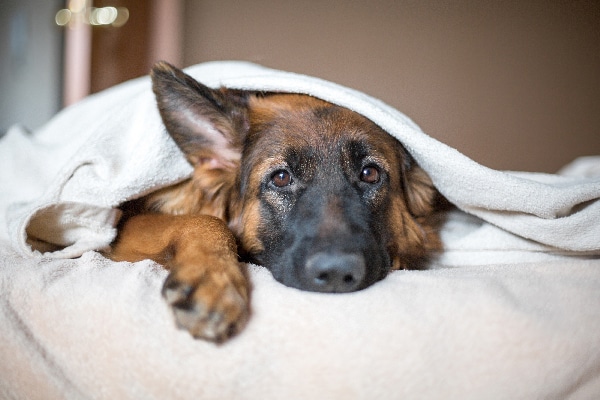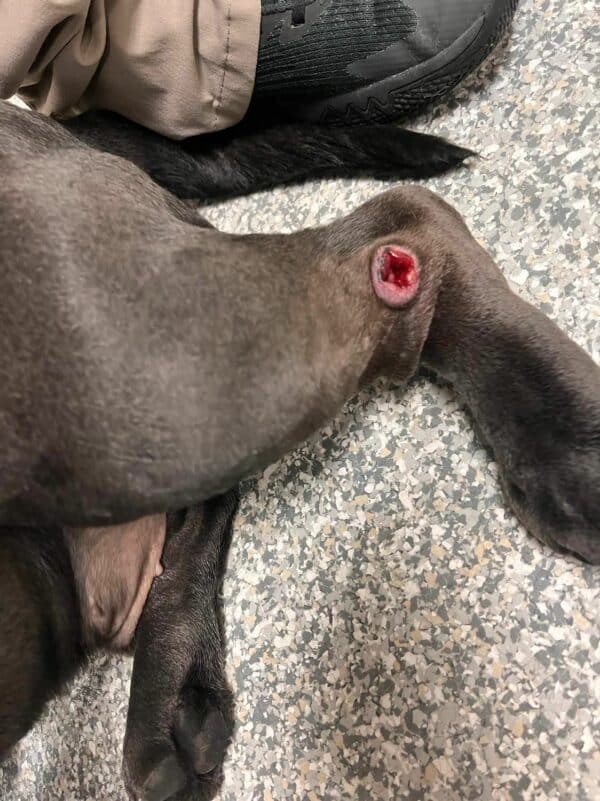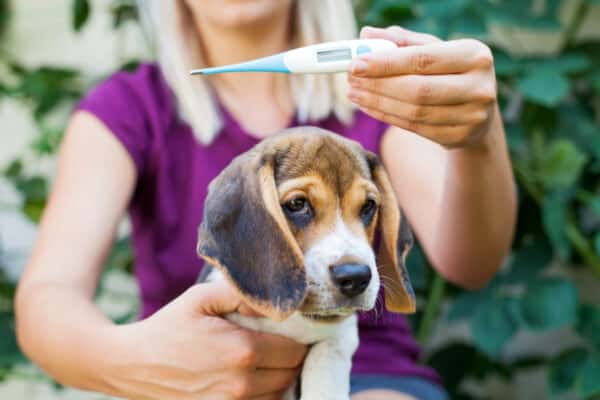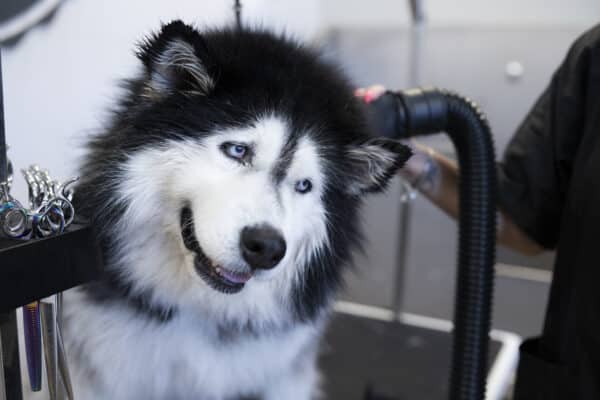Have you ever thought, “Why is my dog restless, especially at night?” That’s the question we asked ourselves over and over again, as our dog Tampa got restless every night and sometimes during the day. Our restless dog paces, going from room to room. He gets out of bed and drinks water, then paces, then goes outside through the doggie door, then comes back in and paces some more. He keeps both us and himself awake at night — it’s not a good situation for anyone involved! There are so many reasons that could factor into your dog’s restlessness. Here’s our journey with our restless dog — and what helped us all get some sleep.
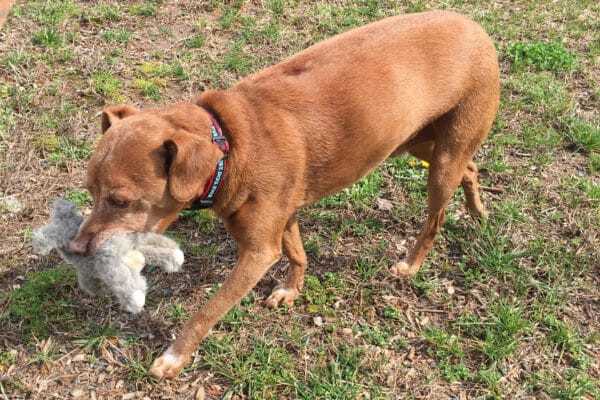
For starters, determine if your restless dog is truly restless — or if there’s something else at play
First off, to rule out a medical issue, we took Tampa to the veterinarian. I would have loved to have a quick diagnosis, but no. We had to take several tests and we are still methodically working our way through them. (The only key issue was that his liver ALP level kept getting higher with no signs of stopping, no matter what we did.) We also talked to our behaviorist. Again, there was no quick diagnosis. Tampa had multiple behavior and medical issues going on and it could be any one of them or a combination. We ended up making changes in a number of areas.
There are many reasons that might be at play when it comes to a restless dog, and here are some of them that applied to Tampa. Not only do I include what my husband and I did, I’ve also added some tips given to us by Dogster readers via Facebook who have also dealt with — and helped — a restless dog.
The 10 Tips for Helping Your Restless Dog
1. Is your restless dog anxious?
A restless dog might be anxious. Tampa has always been a little nervous since we adopted him from the rescue as a pup. He is also noise phobic to really loud sounds like fireworks or sirens. We adopted a new parrot this past year (Tampa has been around parrots all of his life), and this parrot’s scream pitch hurts Tampa’s ears. So, Tampa is always on high alert awaiting the scary bird scream — even though our parrot has never screamed in the evening or at night. This added stress could cause factor into his restlessness.
We discussed Tampa’s nervousness with our veterinarian. He put Tampa on a calming supplement. I give him the supplement at night about half an hour before bed, so it kicks in when we are all trying to sleep. We’ve also tried pheromone products.
We discussed Tampa’s parrot noise phobia with our dog behaviorist. On her advice, during the day we keep the door to my husband’s “man room” — located above the garage — open. This way, Tampa knows he has a “safe space” to go. He can go to this room when he wants to get away from the parrot screaming so he can self soothe. Of course, we also worked with Pi-Pi — our parrot — to lessen the screaming (which wasn’t that much to begin with). Further, the behaviorist had me stop going on high alert if the parrot yelled. I have to act like it was nothing and allow Tampa to self soothe. My anxiety about his anxiety was causing him more anxiety. (Simple, huh?)
When Tampa is feeling anxious, we’ll also wrap him in a blanket. Swaddling or using a pressure shirt like the Thundershirt has helped some dogs feel less anxious. Tampa likes being wrapped in a blanket, especially at night when he’s sleeping.
Other tips to try if you have a restless dog and anxiety is the culprit:
- Dogster reader Dana Oaks has found that CBD pet treats helps. “My dog has no more sleeping issues,” she says.
- Another suggestion was the supplement melatonin, a naturally occurring hormone found in humans and animals, which can help with anxiety. Patty Evans tells Dogster that she gives her dog melatonin per her vet.
- Vinnee Vashistha’s dog sleeps with a Teddy bear at night to calm him down.
- Heather Nelder uses the dietary supplement Cholodin for her dog who has Sundowner Syndrome.
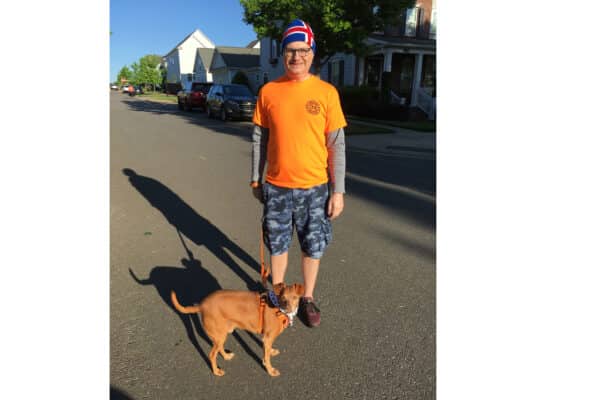
2. Is your restless dog a senior or a puppy?
Is your restless dog a puppy or senior dog? Puppies can be a little anxious at night, missing their pack of puppies or mother or be a little anxious about a new place or just have to go potty.
Tampa is a small dog, 11 going on 12, so he is a senior dog. Our veterinarian said our restless dog problem might be related to age — a little doggie dementia.
So, we worked on keeping Tampa’s mind active. I have gotten more disciplined about taking Tampa on three walks a day, where I give him plenty of sniffing time to keep his mind and senses active. We also give Tampa new experiences like going camping and to other non-taxing events to keep him alert and stave off boredom.
Our veterinarian also gave us a supplement that supports overall mind and body wellness. We give this to Tampa with his dinner. There are a variety of senior dog mental alertness supplements out there now, if it is something you’d also like to try for your restless dog.
Tampa sleeps in bed with us. We started shutting the door to our bedroom at night. This prevented Tampa from walking around the house pacing all night. For some senior dogs and cats, keeping them in a smaller area helps them from becoming confused about where they are. I don’t think this is the issue with Tampa, but keeping him in the bedroom allows us to monitor any worsening or improvement with his restlessness, plus keeps him from getting into mischief during his night pacings. I had lost several magazines and some new books to his nighttime chewing.
3. Does your restless dog have arthritis?
Tampa has arthritis in his legs and back. Arthritis is another possible answer to why you have a restless dog. This condition causes physical discomfort, which can also make your dog not want to lie down. Although I don’t believe this is causing the restlessness, I now give both of my dogs, who have some arthritis in the spine, a little massage at night and in the morning to ease any discomfort. Both dogs are also on a supplement for joints.
4. Is your restless dog hearing things at night — or losing his hearing?
This can go two ways. Either your dog has excellent hearing and he’s hearing small critters in the night, which is keeping him awake and restless, or your dog’s hearing is not great anymore and it makes him a little jumpy. Tampa is losing his hearing and it definitely makes him a little more anxious and more hyper alert and watchful to compensate. We did have a small mouse problem over the winter this year, but Tampa never heard them, only I did, so I know this wasn’t an issue.
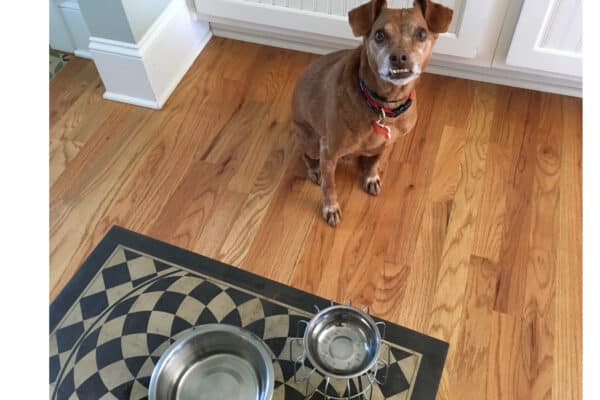
5. Is your restless dog hungry?
This is a big one for us. Tampa is constantly hungry — which is a problem. He paces about every hour wanting food. This is not uncommon. A restless dog might be hungry due to a health issue, not getting enough food or not getting the right kind of food.
Again, we went to the vet to rule out a medical condition and we are still going through the testing process. There are some dog diseases like Cushing’s that cause increased hunger. (Tampa doesn’t have it.) I’ll let you know if we find out a medical condition is causing Tampa’s restlessness and hunger. We already have an appointment with a specialist and will be doing an ultrasound. (We’ve already done blood work and a radiograph.)
Regarding diet, we did change Tampa to a special prescription diet because of concerns about his liver, which definitely made his hunger worse. Because Tampa gained so much weight on the prescription diet, we kept his servings small, but he hasn’t lost the weight. We finally decided because we were feeding him so much less than the recommended amount that we would increase his food intake by giving him three small meals throughout the day, now feeding him right before bedtime. This extra feeding has helped his food anxiety. He’s less likely to wake up looking for food than before, but it hasn’t completely made him a less restless dog. We also have tried giving him some pumpkin before bed, hoping the high fiber might fill up his stomach a little more without packing on the pounds.
We plan on talking to a dog nutritionist next to discuss his weight gain and hunger issues, and to adjust his diet to one that appeases his hunger more.
6. Is your restless dog thirsty?
Tampa was definitely experiencing increased thirst. Again, this is a restless dog issue caused by a medical condition. We thought Tampa had Cushing’s disease because of some concerns with his blood work and all of his symptoms. However, it turns out he had a urinary infection. If your dog has increased thirst, make sure this is the first thing you rule out with your veterinarian. Because we thought it was something else, we didn’t do the urine test until our second appointment. Once this was cleared up, Tampa definitely drank a little less water during the night, but it still didn’t make him a less restless dog.
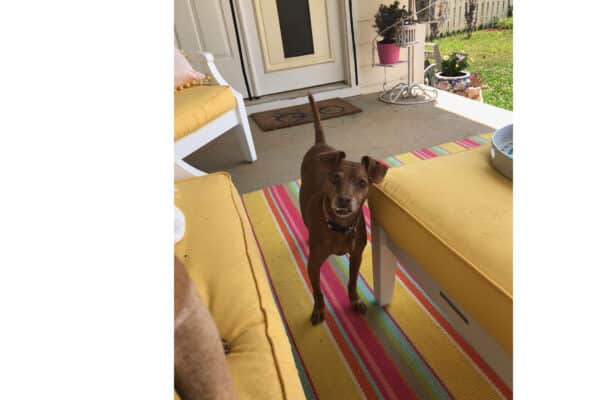
7. Does your restless dog have to potty at night?
Having to go to the bathroom at night happens to puppies, senior dogs and even adult dogs — hey, even us humans. A restless dog might just not be able to hold it … and that could be a medical issue or it’s just because of age for a puppy or senior dog.
In our case, Tampa is a senior dog and sometimes 8 hours is too long for him to go without the potty. We have a doggie door, so this wouldn’t be an issue for us, except we keep the bedroom door shut to keep him from pacing around the house. Getting up once to let him out is fine. We love him, and it gives us a chance for a potty break, too.
8. Is your restless dog too hot or too cold?
Both puppies and senior dogs, small and short-haired breeds, plus brachycephalic breeds (smoosh-faced dogs), are affected by heat and cold. If you have a restless dog, he could be either too hot or too cold. Tampa is a senior dog, and we definitely noticed he went from being like a camel — not affected by heat at all — to being sensitive to it. At night, sometimes he would pant and get up to drink water. I started making the room a little cooler at night, which definitely has stopped the panting.
Dogster reader Lyn Holmes tells Dogster that she uses a hot water bottle in the bed for her Chihuahua, who sleeps with her. “We get in, I move the hot water bottle over and we snuggle down,” she says. “Plus he has a blanket on top of the duvet to snuggle in if he gets too warm in the bed. He has a bowl of water and a bowl of kibble down, and he will occasionally have a midnight snack, I get woken up by his crunching.”
Dogster reader Emma Warrington adds, “Make sure they’re warm. Cover with a blanket or invest in a house coat. It gets cold at night, still.”
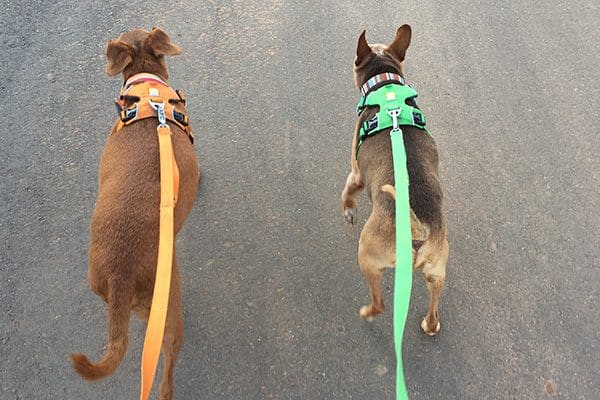
9. Is your restless dog getting enough exercise?
Like a human, a restless dog might not get enough exercise during the day to run off his excess energy. Keeping your dog busy and active during the day is key to good physical and mental health. As exercise helps us all sleep better, my husband and I now give our dogs a nice long walk at night about an hour before bedtime. A tired dog is less likely to be a restless dog.
Dogster reader Sylvia Knutson-Barr concurs. “A nice long walk before bedtime to tire him out” helps her with her restless dog.
Brenda Rogers tells us her dog doesn’t get restless because “she’s so busy all day, she’s exhausted. She’s the best.”
Brianna Benton add some weights to her dog’s walk. She suggests “walking with side saddle bags filled with enough weight for your dog to handle. Maybe put water bottles in them.” (Just like with humans talking to their doctors before using weights, always check with your veterinarian about adding weights to your dog’s exercise regime in case she has any concerns and weight limit suggestions.)
However, Dogster reader Anne Chang does warn, “Don’t get them excited at least an hour before bedtime. Just chill and do your thing. Leave them on their own.”
10. Can a restless dog be restless … simply out of habit?
One thing we’ve noticed about our dog Tampa is that once he learns something, it’s hard for him to unlearn it. For example, every Fourth of July when fireworks go off at night, it takes us about three months to convince Tampa that nighttime doesn’t mean loud noises. Tampa learns a lot of what behaviorists call a behavioral chain.
Whatever has made Tampa restless at night, Tampa has now learned that this is how to react to it. Re-teaching him that nighttime is for sleeping takes a lot of effort. If we know he’s not thirsty, doesn’t have to go to the bathroom or has just eaten and he’s restless at night, my husband just puts him back on the bed and puts his blanket on him. Usually this settles him back down.
The bottom line on helping a restless dog
If you have a restless dog, please try to respond to this with love and patience. This can be hard to do when you aren’t getting enough sleep. I know people who have shut the dog out of the bedroom so they don’t have to hear the dog pacing, but then they can’t monitor the dog and if the problem is anxiety, it can make the behavior of your restless dog worse.
There are many reasons that factor into a restless dog, and these are just some of them that we felt might be contributing to our dog’s restlessness. If you have a restless dog, go through this list and see if you can make some tweaks to your dog’s daily schedule. Some will work for your dog and your family and some won’t. It’s not uncommon for humans to sleep less and get restless at night as they get older, so it’s not a surprise that it happens to some dogs, too. My husband and I — knowing that Tampa would wake us up during the night — would sometimes go to bed earlier to get enough sleep.
Getting a veterinarian and dog behaviorist to help is key, especially if it is a medical issue or anxiety issue. Be patient, as a medical diagnosis could take a while, especially getting in to see a specialist and waiting for test results. Tampa has had this issue for a good six months, and we are still trying to figure it out. If you have any tips for how you helped your restless dog, we would love to hear them in the comments below. Making these changes have helped us go from Tampa waking up four or five times in the night to just one time. That’s a big difference!
Read Next: My Dog Stares at Me — Is That Normal?

